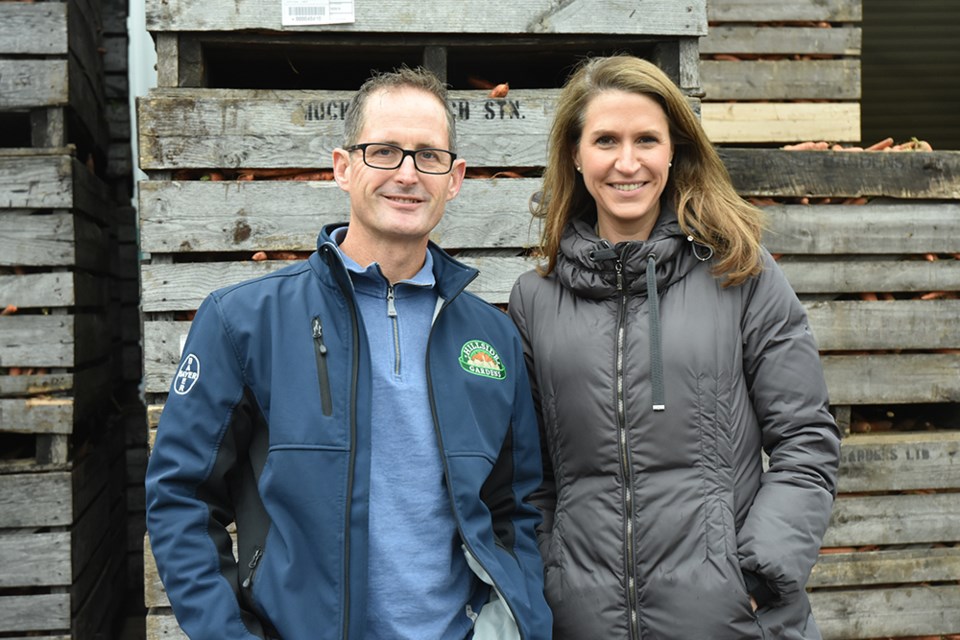Hillside Gardens in the Holland Marsh farms, packs and ships carrots, onions, turnips, parsnips, celery and beets, and employs 150 workers.
“We grow 900 acres in Canada, about 1,000 acres in the U.S.,” said Ron Gleason, the company’s president.
And of the United States-grown produce, “A lot of that comes here and gets packed here, so it makes Canadian jobs.”
But like so many Ontario businesses in agriculture and other sectors, Hillside said he has struggled under Ontario’s regulatory burden, high fuel costs and soaring hydro rates.
On Friday, Gleason welcomed York-Simcoe MPP and Attorney General Caroline Mulroney to Hillside for a tour of the packing operation and roundtable consultation on the needs of local business.
During the past several months, Mulroney has been meeting with farmers, tradespeople, businesses and workers, gathering information for the Making Ontario Open for Business Act, introduced Tuesday to replace the Liberals' Bill 148, cancel the January 2019 minimum wage increase to $15, and set new requirements for paid leave and time off.
In particular, Gleason told Mulroney, “The minimum wage impact has been huge to us — a $275,000 hit to the bottom line” this year alone.
Bill 148 requires farmers to pay off-shore visiting workers the increased minimum wage — money that not only usually leaves the country, sent home by the workers — which leaves the company struggling to also raise the wages of Canadian workers.
“Quebec’s minimum wage is $12 an hour. We’re at a distinct disadvantage,” said Gleason. “Ontario agricultural producers have to compete with regional producers.”
Mulroney noted her government’s new bill will freeze the minimum wage at $14 until 2020, and then allow for gradual increases to keep pace with inflation.
She said it is not possible to roll back the increase already in place.
“Is there something the government can do to offset?” said Gleason. “To add some of those dollars back in that we lost from the bottom line? We don’t need a lot of hand-hold(ing), but when the playing field isn’t level…”
He also called for a reduction of red tape and regulation, and a new look at Ministry of Environment requirements that put farmers in the position having to operate as sewage treatment plant operators, under threat of being closed down.
“I’m for regulations, if they’re reasonable”, but not for spending huge amounts of money on something that will have a “virtually negligible impact on the environment,” he told the MPP.
Gleason called for greater co-operation and support from the ministry, “rather than coming in and threatening us… Partner on that, with reasonable timelines.”
The adversarial approach is “a culture we’d like to address,” Mulroney agreed. “Our goal is to lower the cost of doing business here. We want to dial that back. That’s what the Red Tape Reduction Act is all about.”
“You guys are doing some great stuff. We’re extremely pleased,” said Gleason. “Love it.”
In addition to the freeze on the minimum wage, the Making Ontario Open for Business Act also makes changes to personal emergency leave rules, taking away the current allowance of up to two paid sick days, and it reduces the journeyman-to-apprenticeship ratios, opening new opportunities for youth and other workers.
“When I speak with workers, tradespeople, farmers and other small businesses in York-Simcoe, they tell you Ontario had been moving in a direction that threatened our communities by squeezing jobs, workers and many young people out of the economy,” Mulroney said.
“We are reversing this troubling decline in our communities with a smart and responsible approach to making Ontario open for business.”
Reducing red tape and lifting the burden of Ontario’s 380,000 regulations for businesses that don’t have the manpower to devote to compliance is one of the “easiest” and least expensive ways to help, she said.
Other local businesses that have recently consulted with Mulroney and the Progressive Conservative government include Gwillimdale Farms and South Simcoe Freight Ltd.
“Bill 148 squeezed jobs out of the province and made businesses like mine less competitive. It put small businesses and communities at risk,” said Sarbie Singh, of South Simcoe Freight.
“The Ford government’s action to keep jobs in Ontario is the hope and certainty I need to move from just finding ways to survive, to actually planning to grow my business.”
